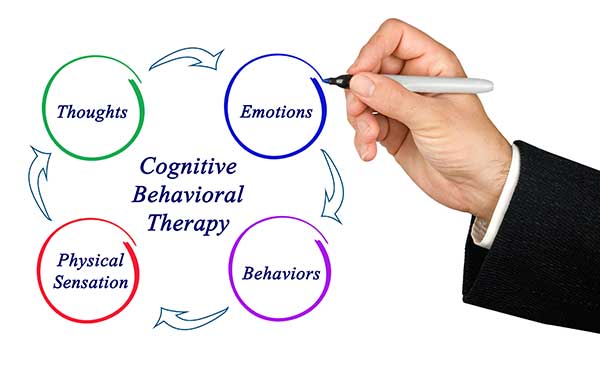Psychotherapy

Cognitive Behavioral Therapy (CBT)
Oftentimes, people can develop unconscious unhealthy thought patterns and behaviors throughout the lifespan due to childhood attachment issues that affect current relationships. Talk therapy has been a proven, evidenced based treatment that has assisted many individuals for centuries. One therapeutic approach that is well-known with a structured goal plan, is Cognitive Behavioral Therapy (CBT). This therapeutic approach once practiced on a daily basis can help reduce the negative cognitive distortions and bring positive thoughts and emotions back into your life.

How Does CBT Work?
CBT combines what is discussed during each session with behavior modification techniques that work towards creating healthy, productive coping skills and strategies that will alleviate symptoms and improve quality of life. Through weekly online video sessions and CBT techniques, you will learn to be more attuned to your thoughts and emotions and actively create the change needed to incorporate positive from negative thought patterns.
CBT Will Help you Learn to
CBT combines what is discussed during each session with behavior modification techniques that work towards creating healthy, productive coping skills and strategies that will alleviate symptoms and improve quality of life. Through weekly online video sessions and CBT techniques, you will learn to be more attuned to your thoughts and emotions and actively create the change needed to incorporate positive from negative thought patterns.
Identify Negative Thoughts about oneself, others, or the world that are distorted and/or no longer helpful to your current life situation.
Understand the Impact of negative thoughts on mood and behaviors and how that contributes to issues like anxiety, depression, problematic behaviors and interpersonal problems such as social and romantic relationships.
Challenge and Reframe the accuracy of intrusive thoughts and reframe them into more positive, realistic ones.
Behavioral Techniques that align with your current goals and new thought patterns.
Create Goals using problem-solving skills to approach challenges in a healthier manner.
- Trauma
- Depression
- Anxiety Disorders
- Panic Attacks
- Phobias
CBT has been demonstrated to be effective for those who may experience:
- Trauma
- Depression
- Anxiety Disorders
- Panic attacks
- Phobias
- Grief and loss
- Substance Abuse
- Other Mental Health Concerns

Trauma Focused Cognitive Behavioral Therapy (TF-CBT)
TF-CBT, as the name states, specifically focuses on trauma, which applies the same tenets of CBT psychotherapy. TF-CBT is recommended for adolescents 18 and under who have experienced childhood emotional, physical, sexual abuse and neglect, as well as for adults who have also been affected by traumatic events in their lives. The main components of TF-CBT can be summarized by the acronym PRACTICE:
P: Psychoeducation with the clinician, clients/patients will gain an understanding of what triggers to look out for and how to prepare to cope during those experiences and learn to apply self-care.
R: Relaxation Techniques: The clients/patients will learn to utilize relaxation techniques such as breath work and many other strategies such as visual imagery, and progressive muscle relaxation.
A: Affective Expression and Regulation: The clients/patients will learn to focus on inner attunement to help identify and share current emotions while the clinician may use this phase to model beneficial skills and healthy communication strategies along with self-soothing strategies that could assist to decrease feeling overwhelmed.
C: Cognitive Coping and Processing: The clients/patients will learn how distorted thought patterns can impact healthy coping skills. With awareness of cognitive distortions, recognition of these patterns become easier and manageable in order to create positive change.
T: Trauma Narration and Processing: The clients/patients at this stage with the assistance of their clinician, are ready to discuss, review, and become desensitized from their traumatic events. In return, they will slowly feel safe to share their traumatic events and have inner strength to deal with the negative body experiences.
I: In Vivo Exposure: The clients/patients at this stage will be ready to tolerate negative body sensations situations that have been pent up by practicing self-regulation skills.
C: Conjoined Sessions: The clients/patients especially those under 18 will be able to strengthen their bond with their caregiver by including their caregiver in the dialogue while the clinician guides the process in a safe environment.
E: Enhancing Personal Safety and Future Growth: The clients/patients in this final stage will learn to integrate safety and awareness skills to foster healthy relationships and obtain stronger self-esteem. The application of Coping skills and preparation of how to prevent future self-sabotaging techniques will be highly emphasized at this final juncture.
If you or a loved one are interested in learning more about any of these types of Psychotherapy, please call us at (650) 691-3438 or email us at referral@psycheregistryservices.org.
